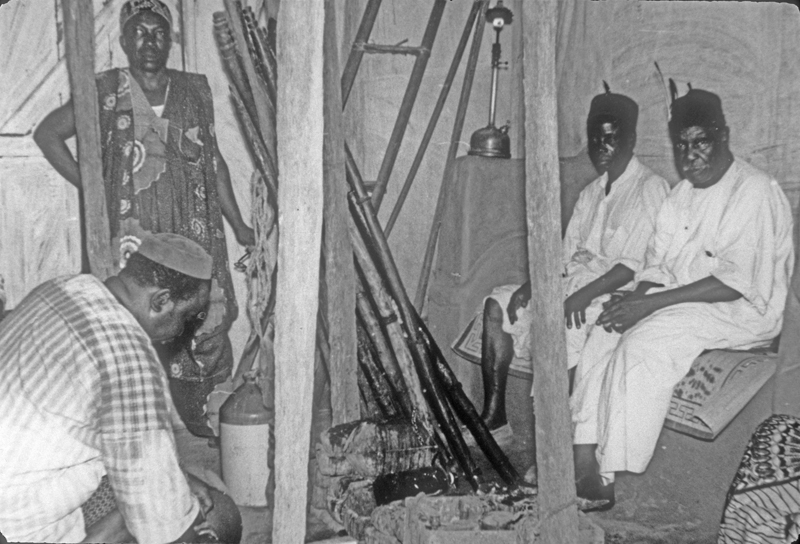In a narrative by the reverend Prof. Chinua Achebe, he opined that because of the natural apprehension to creating an all powerful individual as evinced in the name “Ezebuilo”, the process of acquiring traditional titles by the Igbos had been deliberately made expensive for the intending such that by the time a person is done with the acquisition of the highest title in the land, he is so impoverished that much of what is left is the prestige associated with the title.
 Ozo Title Holders. Source: https://amightytree.org/barrister-emejulus-ichi-ozo/
Ozo Title Holders. Source: https://amightytree.org/barrister-emejulus-ichi-ozo/
Basden notes that in some [Igbo communities] custom forbids even the wearing of loin cloth until he has entered the first degree of a title rank, and title taking is expensive.
An interesting observation from the forgoing is: first, that the Igbo custom presents a condition that makes title taking inescapable and then creates an insurance against the tyranny of a wealthy minority. Furthermore, as I would like to imagine, the value placed on this honour culture (acquiring these titles) means that individuals accept that to secure any honorable position among their people, they must succeed in their chosen field and, more importantly, acquire wealth. The last part is telling but I digress.
 Ozo title ritual procession . Source: https://amightytree.org/barrister-emejulus-ichi-ozo/
Ozo title ritual procession . Source: https://amightytree.org/barrister-emejulus-ichi-ozo/
Given the cost of acquiring these titles, individuals may settle for any of the lower class of titles to the degree that their wealth can take but rarely would they go through life without acquiring any. The more ambitious and those with the means may proceed to attain the more advanced Ozo title.
The Ozo title is in many Igbo communities one of the highest traditional titles pursuable in the Igbo nation. It is also, of course, the more expensive class of titles. There are certain rules on moral and civil conduct an Ozo title holder must maintain (we may discuss this later). In the Ozo class of titles, four orders are identifiable- Okpala, Eze, Ume, Dim.
Earls, Counts, Barons proudly wear their titles. I would assume that the Igbo man who had gone through the troubles of acquiring the Ozo class of title at great cost, will proudly let the world know of his accomplishment. Just as, say, the word “Baron” appeared before the given name so do these order names; example:
[order name] + [given name] = New name
Ume + Oraka = Umeoraka
Eze + Okeke = Ezeokeke
And so, you will find vestiges of these orders in Igbo proper names; conventionally appearing as prefixes in proper names and in such a way as to be rendered as a single word; in some cases, creating a whole different name and meaning from the original personal name. In rare cases, these order names are found as suffixes (I will return to this in a moment).
The challenge is that this order names (Okpala, Eze, Ume, Dim) possess independent meanings and so this presents some difficulty in accurately defining these group of names. For instance, where an ancestor named Oraka meaning “The people are supreme” took an “Ozo-Ume” title and somehow his progenies decide to retain his traditional title, it may lead to a new name- “Umeoraka”; this new name arising from prefixing the Ozo order (Ume-) to a person’s given name (-Oraka), has a different meaning: “the noble who the people are greater than”.
One may without proper inquiry take the new name literally. What we have done is to identify these names where they are unclear and present a possible alternative translation
Were these order names added as suffixes, it could have become immediately clear that they are not a part of the given name. For example, the “Dim” in the Ikemba Nnewi’s name ‘Chukwuemeka Odumegwu Ojukwu (Dim)’ often appears at the end of his names. If placed in the front of the name in, say, “Dimchukwuemeka”, it would potentially, further down generations, present a challenge in future resolution of the name. As in a game of broken telephone, ideas get lost and words begin to take different meaning.